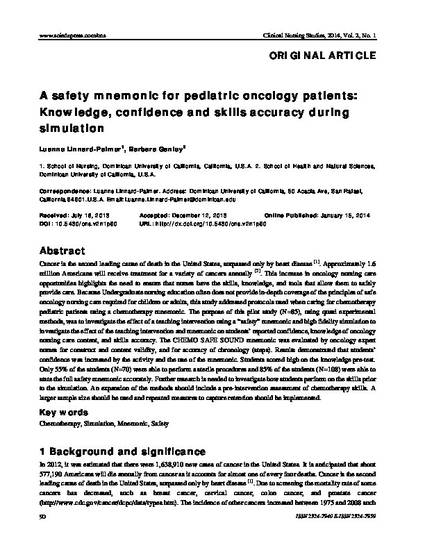
Cancer is the second leading cause of death in the United States, surpassed only by heart disease [1]. Approximately 1.6 million Americans will receive treatment for a variety of cancers annually [2]. This increase in oncology nursing care opportunities highlights the need to ensure that nurses have the skills, knowledge, and tools that allow them to safely provide care. Because Undergraduate nursing education often does not provide in-depth coverage of the principles of safe oncology nursing care required for children or adults, this study addressed protocols used when caring for chemotherapy pediatric patients using a chemotherapy mnemonic. The purpose of this pilot study (N=85), using quasi experimental methods, was to investigate the effect of a teaching intervention using a “safety” mnemonic and high fidelity simulation to investigate the effect of the teaching intervention and mnemonic on students’ reported confidence, knowledge of oncology nursing care content, and skills accuracy. The CHEMO SAFE SOUND mnemonic was evaluated by oncology expert nurses for construct and content validity, and for accuracy of chronology (steps). Results demonstrated that students’ confidence was increased by the activity and the use of the mnemonic. Students scored high on the knowledge pre-test. Only 55% of the students (N=70) were able to perform a sterile procedures and 85% of the students (N=108) were able to state the full safety mnemonic accurately. Further research is needed to investigate how students perform on the skills prior to the simulation. An expansion of the methods should include a pre-intervention assessment of chemotherapy skills. A larger sample size should be used and repeated measures to capture retention should be implemented.
Copyright © Sciedu Press
Available at: http://works.bepress.com/luanne_linnard-palmer/44/
